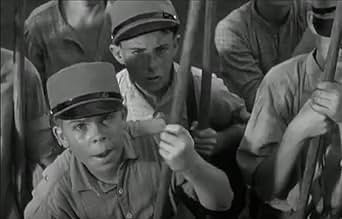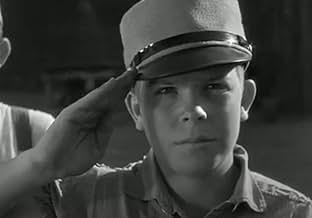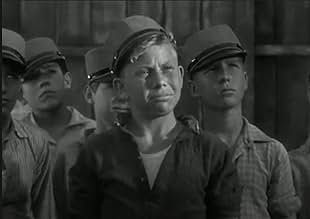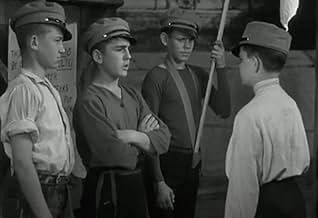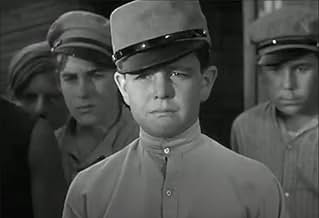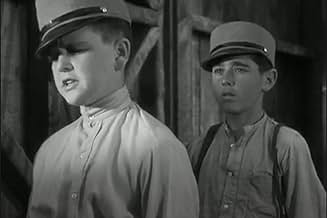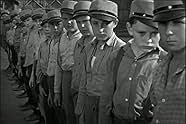Füge eine Handlung in deiner Sprache hinzuFrail Nemecsek, a lonely boy craving belonging, idolizes charismatic Boka, leader of a gang, in an evocative depiction of youth's pain and war's senselessness.Frail Nemecsek, a lonely boy craving belonging, idolizes charismatic Boka, leader of a gang, in an evocative depiction of youth's pain and war's senselessness.Frail Nemecsek, a lonely boy craving belonging, idolizes charismatic Boka, leader of a gang, in an evocative depiction of youth's pain and war's senselessness.
- Regie
- Drehbuch
- Hauptbesetzung
- Auszeichnungen
- 3 Gewinne & 1 Nominierung insgesamt
George P. Breakston
- Nemecsek
- (as George Breakston)
Jimmy Butler
- Boka
- (as Jimmie Butler)
Samuel S. Hinds
- Father
- (as Samuel Hinds)
Empfohlene Bewertungen
This is a bizarre and very heavy-handed film. Instead of showing adults at war, this film does war on a small scale--with children playing war. This isn't just kids playing war, but they have ranks, follow orders and act much like adults would in war. And, almost the entire film consists of kids acting--with only a few adults here and there. This strange idea seemed to impress most of the reviewers but I couldn't get into it--mostly because it all seemed rather fake and I also thought that children playing war and acting as if it's all lots of fun just seemed a bit grotesque. Although I know it was meant as an allegory about war and heroism and the futility of war--it seemed like it could also be taken as a pro-war film as well! As for the kids, all but Frankie Darro were unknowns and the acting, for kids, was pretty good. But it was also sappy from start to finish--and also made war seem pretty cool--like a recruitment film for the next war.
I guess I am a voice of dissent, but I didn't like the film--though I did at least respect the acting (for the most part) and give it a 4 simply for technical merit. Also, I nominate George P. Breakston for a special award for Best Performance By a Crazy Kid for his acting at the 61 minute mark. It has to be seen to be believed. Further, I nominate all the parents for the Most Irresponsible Parenting award for encouraging their little ragamuffins to become little warmongers.
I guess I am a voice of dissent, but I didn't like the film--though I did at least respect the acting (for the most part) and give it a 4 simply for technical merit. Also, I nominate George P. Breakston for a special award for Best Performance By a Crazy Kid for his acting at the 61 minute mark. It has to be seen to be believed. Further, I nominate all the parents for the Most Irresponsible Parenting award for encouraging their little ragamuffins to become little warmongers.
What makes NO GREAT GLORY atypical for Borzage is that there is no central romantic couple, but this film, a stirring and vivid anti-war drama from the perspective of children (based on Molnar's THE BOYS OF PAUL STREET, which has been filmed on several other occasions), remains one of Borzage's most powerful, and shows the great range of his talent. Using a large cast of children, he is able to get some of the finest performances from many of the child actors, most of whom were Hollywood veterans by this point: George Breakston, Frankie Darro, etc. Yet here, with Borzage's patient guidance, they give fresh and touching performances. Borzage is always able to find great humanity in his performers, and the sorrowful story becomes truly tragic, because Borzage truly engages your emotions and your mind. This is another movie that is not available, and should be made available (and should be shown as often as possible).
This forgotten little family / children's film is about bigger adult issues. This sweet film is about acceptance of those who are different. It uses so much symbolism and so many metaphors it seems is seems like the whole cast is on a soap box. But it's worth it. During the heart of the Great Depression with a pending war in Europe these issues needed to be raised by those who would be fighting for them just ten years later. Two rival gangs of school boys are at war over the same vacant lot as the only place left for them to play. The writer and director focus on the world as the boys see it and so the audience is brought inside the walls of the fort and the earnest issues of homeland, friendship, loyalty and tolerance. An almost too sweet story unfolds and we get to know these youngsters and are touched by their views. I recommend this film and thank Cinesation, the annual Silent & Early Film Festival held in Michigan each fall for playing it on the big screen!
No musical spots, no romantic sub-plots, not even a girl around! Well, there's the great Lois Wilson as the leading kid's mother, and she's always worth watching, but make no mistake - this is about how boys develop their thinking process, their pecking order, and their views of the world. Not a hint of "boys will be boys," but boy, is it ever obvious in this unusually fearless, serious piece of anti-war propaganda. I would love to see this film restored, revived, and road-show-presented to every school in the country. It doesn't matter a dot that there are no girls in the story, either, as the subject is more valid today, perhaps, in light of world terrorism and how boys are being raised in other lands, than it might have been considered in 1934. We've enjoyed Molnar plays and tales - Liliom, The Good Fairy, The Guardsman, et al, but nothing prepared me for this hard-hitting, no holds barred filming of his book, the Paul Street Boys. There are plenty of marvelous character players, including Christian Rub, Samuel S. Hinds, Ralph Morgan, and of course, Miss Wilson, but it is the younger actors who race away with this picture, particularly everyone's favorite brat, Jackie Searle (who will not disappoint you!), and everyone's favorite tough guy, Frankie Darro, here offering a more layered, thoughtful performance than he is usually allowed to give. Though all the boys are terrific, one stands out, young Georgie Breakston (remember that wonderful moment in IT HAPPENED ONE NIGHT just after everyone sings "The Man on the Flying Trapeze" - the bus hits the mud and everyone goes flying - it was Georgie Breakston who broke the mood with his plaintive "Ma! Ma!" and gets the money from Colbert and Gable!!) effectively carrying the picture on his tiny shoulders. His performance in NO GREATER GLORY makes a lot of more famous child players seem like cardboard cut-outs. Write to your Congressman about this one, but try and find a copy and show it to your children!
Frank Borzage's films puzzle me in many respects. I can't figure out how he manages to move us but he does. I've seen all the often-quoted films - "Three Comrades", "Mortal Storm", "Man's Castle", "Seventh Heaven" - on more than one occasion and yet each time I am truly moved.
I first caught "No Greater Glory" at the Cinematheque in Paris with a friend when we were studying film. The audience was actually moved to tears! We're talking here about a French audience, a foreign language film not particularly well dubbed on film, an era never experienced by the young audience present at the time and performances by child actors unknown for the most part. Yes, the context in the film was European as were the names and places but the situation was Depression-era America, let there be no doubt about that, as were the actors and production staff. I'm still amazed why and how it worked its magic.
The young actors are never "cute", the lines in the film are more adult than child-like, the performances quite adequate but with no pulling-out-all-the-stops Academy Award-winning emoting. In short, it doesn't "feel" like a manipulative movie in any traditional sense of the word, yet we are manipulated by Borzage's hatred of war in general and his remarkable compassion and sincerity in translating his feelings onto the screen. This film is an absolute must!
Curtis Stotlar
I first caught "No Greater Glory" at the Cinematheque in Paris with a friend when we were studying film. The audience was actually moved to tears! We're talking here about a French audience, a foreign language film not particularly well dubbed on film, an era never experienced by the young audience present at the time and performances by child actors unknown for the most part. Yes, the context in the film was European as were the names and places but the situation was Depression-era America, let there be no doubt about that, as were the actors and production staff. I'm still amazed why and how it worked its magic.
The young actors are never "cute", the lines in the film are more adult than child-like, the performances quite adequate but with no pulling-out-all-the-stops Academy Award-winning emoting. In short, it doesn't "feel" like a manipulative movie in any traditional sense of the word, yet we are manipulated by Borzage's hatred of war in general and his remarkable compassion and sincerity in translating his feelings onto the screen. This film is an absolute must!
Curtis Stotlar
Wusstest du schon
- WissenswertesJimmy Butler was killed during World War II on February 18, 1945 in France.
- VerbindungenEdited from Im Westen nichts Neues (1930)
Top-Auswahl
Melde dich zum Bewerten an und greife auf die Watchlist für personalisierte Empfehlungen zu.
- How long is No Greater Glory?Powered by Alexa
Details
- Laufzeit
- 1 Std. 14 Min.(74 min)
- Farbe
- Seitenverhältnis
- 1.37 : 1
Zu dieser Seite beitragen
Bearbeitung vorschlagen oder fehlenden Inhalt hinzufügen

